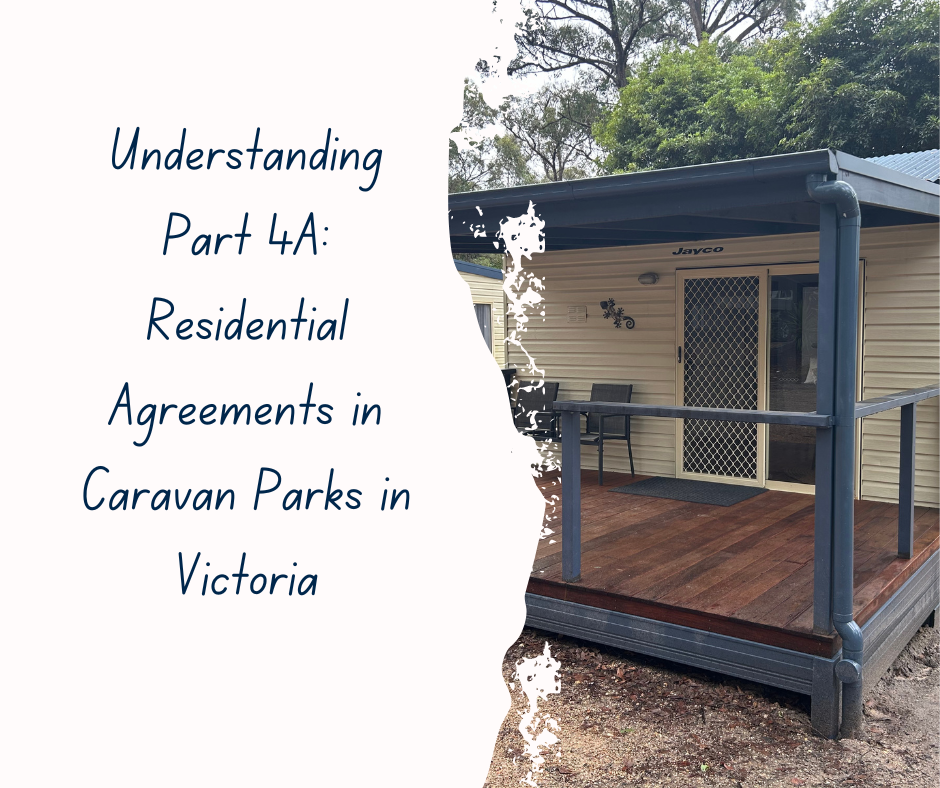Understanding Part 4A: Residential Agreements in Caravan Parks in Victoria
In Victoria, residential agreements for caravan parks are governed by specific legislation designed to address the unique nature of these living arrangements. Part 4A of the Residential Tenancies Act 1997 (VIC) outlines the rights and responsibilities of residents and park operators, aiming to provide clarity and fairness in these specialized residential settings. This article delves into the key aspects of Part 4A, offering an overview of its provisions and implications for both residents and operators in Victoria.
Purpose of Part 4A
Part 4A of the Residential Tenancies Act 1997 addresses the distinct needs of residents living in caravan parks. Unlike traditional rental properties, caravan parks can accommodate a range of living situations, from short-term stays to permanent residences. This section of the Act aims to ensure that these arrangements are governed by clear, fair rules that account for the specific circumstances of caravan park living.
Key Provisions of Part 4A
1. Definition and Scope of Residential Agreements
Under Part 4A, a residential agreement in a caravan park refers to any arrangement where an individual (the resident) is entitled to occupy a caravan or a site within a caravan park for residential purposes. This definition helps distinguish between different types of accommodation and establishes the legal framework for residential agreements within these parks.
2. Written Agreements
Part 4A requires that all residential agreements be formalized in writing. The written agreement must detail essential terms, including the rent amount, payment schedule, and any rules or conditions governing the tenancy. This provision is designed to ensure that both parties have a clear understanding of their obligations and rights, minimizing the potential for disputes.
3. Rent and Payment Terms
The Act regulates how rent is to be set and adjusted in caravan parks. Rent increases are subject to specific rules, including the need for proper notice and adherence to limits on the frequency and amount of increases. Additionally, the agreement must specify the rent payment schedule, providing transparency and predictability for residents.
4. Rights and Responsibilities
Part 4A delineates the rights and responsibilities of both residents and park operators. Operators are required to maintain the park in a reasonable condition, ensuring that facilities and amenities are kept in good repair. Residents, on the other hand, must comply with park rules and avoid causing disturbances. These provisions help create a balanced and respectful living environment.
5. Termination of Agreements
The process for terminating a residential agreement in a caravan park must comply with the notice periods and conditions outlined in Part 4A. Whether a resident wishes to leave or an operator needs to end the arrangement, the Act mandates fair procedures to ensure that neither party is subjected to sudden or unjust termination. This aspect of the Act provides stability and allows residents adequate time to make alternative arrangements.
6. Dispute Resolution
Part 4A provides mechanisms for resolving disputes between residents and park operators. Disputes can be addressed through mediation or adjudication, offering a structured process for resolving conflicts. This helps ensure that issues are handled fairly and in accordance with the law.
Implications for Residents and Operators
For residents, Part 4A ensures protection and clarity. It guarantees that their rights are upheld and provides a legal framework for addressing issues such as rent increases and maintenance concerns. The requirement for written agreements and formal termination procedures contributes to a more secure and predictable living situation.
For park operators, compliance with Part 4A involves adhering to specific legal requirements, including maintaining the park and managing rent adjustments according to the Act. While this involves administrative responsibilities, it also fosters a professional relationship with residents and helps maintain a well-regulated environment.
Conclusion
Part 4A of the Residential Tenancies Act 1997 plays a vital role in regulating residential agreements within caravan parks in Victoria. By establishing clear rules and responsibilities, it aims to create a fair and transparent living environment for all parties involved. Understanding these provisions is essential for both residents and operators, ensuring that they are aware of their rights and obligations and contributing to a harmonious and well-regulated residential setting.



